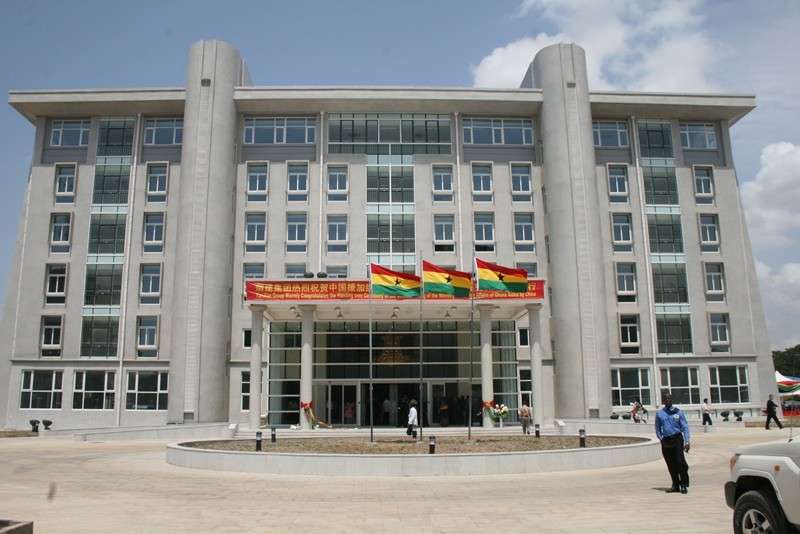The policy think tank IMANI Center for Policy and Education has issued a bold call for an accountability reset across Ghana’s embassies in light of a major fraud case at the country’s diplomatic mission in Washington, D.C.
According to IMANI, the Washington incident is a development that threatens to undermine the governance reform agenda launched by President John Dramani Mahama.
In May 2025, President Mahama announced an eight-pillar “Reset” strategy intended to overhaul governance, reinforce fiscal discipline, and rebuild trust between the Ghanaian state and its citizens.
However, IMANI pointed out that the recent discovery of a years-long fraud scheme at one of the country’s most prominent foreign missions casts serious doubts on the viability of those reforms if key overseas institutions remain misaligned.
“If the ‘Reset’ agenda truly means business, it must begin by bringing every overseas mission into alignment with the very heart that will heal Ghana’s public finances and restore institutional trust.
“President Mahama’s eight pillars are more than slogans. They call on government to complete the IMF programme with iron-clad fiscal targets; to reopen capital markets in a manner that rebuilds investor confidence; to revitalise exports via the Ghana Exim Bank; and above all to clear domestic arrears, rationalise public investments, and embed real-time budgeting through the Treasury Single Account (TSA) and the Ghana Integrated Financial Management Information System (GIFMIS).”
IMANI Center for Policy and Education
According to IMANI, the fraud at the Washington embassy was not an isolated lapse but the result of systemic failures.
At the center of the scandal was an unauthorized online payment link—created in 2017 during Ambassador Barfuor Adjei-Barwuah’s tenure—which siphoned unrecorded passport and visa fees for years.
The scheme remained undetected throughout the previous administrations until a forensic audit in early 2025 led to the mission’s temporary closure in May.

According to the policy think tank, the scandal revealed a dangerous gap between the president’s vision and ground-level realities.
As such, IMANI emphasized that successful implementation requires tight oversight, digital transparency, and fiscal accountability, especially within foreign missions that act as frontline representatives of the state.
IMANI Wants Real-Time Audits In Missions
The think tank contended that Ghana cannot afford to allow overseas missions to operate without modern financial safeguards.
The fraudulent payment link remained undetected largely because it was shielded by diplomatic immunity and slipped past routine audits due to three critical loopholes.
“Three distinct lapses conspired to let the fraud persist,” IMANI said, citing institutional and regulatory weaknesses that allowed misconduct to flourish in the shadows.
According to IMANI, these included the exemption of embassy procurements from competitive bidding processes, the Auditor-General’s limited capacity for IT forensic investigations, and the lack of regular revenue reconciliation between the Ministry of Foreign Affairs in Accra and Ghana’s embassies abroad.
As such, the policy think tank stressed that any serious accountability reset must begin with aggressive governance reforms that extend beyond Ghana’s borders.

To this end, IMANI proposed a four-pillar foreign-service reform blueprint aligned with President Mahama’s “Reset” agenda.
“First, legal and regulatory amendments should extend the Audit Service Act to mandate annual IT-forensic audits of all diplomatic-mission platforms and tighten procurement rules in the Diplomatic Service Regulations by requiring competitive bidding and clear sunset clauses for ICT contracts.
“Second, institutional strengthening calls for the creation of an MFA–Audit Service Liaison Unit, with rotating financial-control officers in each mission and fortified whistle-blower protections that extend Ghana’s domestic framework to staff overseas.”
IMANI Center for Policy and Education
IMANI also recommended a strong focus on digital innovation and ethics reform to strengthen accountability across Ghana’s foreign missions.
It proposed the introduction of a unified consular services platform managed by the Ministry of Foreign Affairs (MFA), incorporating blockchain-backed receipts and real-time service dashboards accessible in Accra to enhance transparency.
Alongside this, IMANI called for the implementation of a Diplomatic Integrity Code that would require annual asset declarations and professional ethics training for all diplomatic staff.
This, the outfit noted, should be supplemented by regular workshops on IT forensics to build the technical capacity needed to prevent future financial misconduct.

These reforms, IMANI said, must be backed by political will and executed in stages.
In the first six months, the Washington audit should be completed, legislative amendments passed, and a pilot version of the new consular system launched in the U.S. mission.
Over the next year, these tools would be scaled up to cover all missions. Within two years, a Mission’s Accountability Report should be integrated into Ghana’s National Anti-Corruption Strategy.
Global Models to Guide Reforms In Ghana’s Embassies
Moreover, IMANI underscored that other countries offer valuable templates for reform. The United Kingdom’s Foreign Office employs confidential audits of its overseas posts.
Canada publishes consular performance metrics on open-data platforms, and Kenya regularly summons ambassadors for parliamentary scrutiny of embassy finances.
According to IMANI, adapting such systems could help Ghana leapfrog outdated practices and instill real-time governance.
The Washington fraud, IMANI argued, was symptomatic of a broader culture of neglect in overseas financial governance.

With weak compliance mechanisms and no embedded audit capacity, embassies risk becoming, in IMANI’s words, “shadow economies under the guise of consular service.”
“Reset is not simply a campaign slogan; it is an urgent covenant between the Ghanaian state and its citizens,” the think tank warned.
It emphasized that restoring trust begins with showing that the government’s reform pledges apply equally to foreign missions and domestic institutions.
Ultimately, IMANI concluded that achieving an accountability reset will require deliberate action across legal, digital, institutional, and ethical domains.
Only then can Ghana ensure its embassies operate with transparency and integrity, preserving public trust and protecting national resources on the global stage.
READ ALSO: Gaza Humanitarian Foundation Appoints Pro-Israel Evangelical Leader As New Chief




















